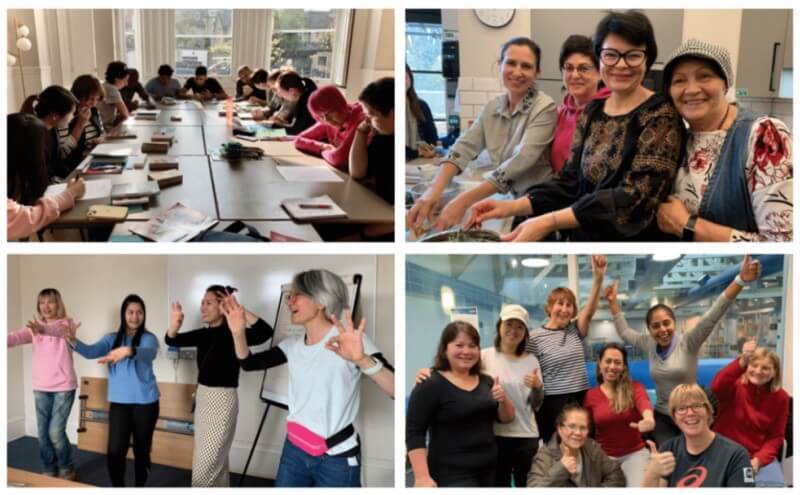Read the original text here:
https://www.bera.ac.uk/publication/spring-2024
Learning English through friendship: Work & ethos of informal community EAL
Ruth Durant
Richmond EAL Friendship Group
Over 1,000 adults speaking different languages have attended free informal English classes at the Richmond EAL [English as an additional language]1 Friendship Group since 2001. Why don’t they go to English for speakers of other languages (ESOL) classes at local colleges? Why do they want to be in a non-accredited class, with learners at all stages of acquiring English – from total beginners to competent and almost fluent masters of the language? The answer is that for almost all new arrivals in any country, the key missing ingredient is friendship. A supportive network is the best medicine for loneliness, and one of the best methods of building independence, confidence and self-esteem (Mind, 2022).
Friendship has helped our learners make sense of their new lives in the UK. Formal education offers qualifications, but informal education can offer life-changing experiences through the creation of sustainable friendships across the traditional barriers of language, ethnicity, religion and economic status. ‘Coming to these classes is like coming to a birthday party every day!’ ‘I always wait for Tuesdays – my favourite day.’ ‘Being in class is like being with my family.’ These are typical responses to our classes and make us feel valued as teachers in a unique manner.
My first experience of teaching an additional language was in Israel, where I supported Arabic-speaking Jewish children from refugee families who had been forced to leave their homes. I was teaching them Hebrew, but had only just completed an intensive Hebrew course myself and was never more than a couple of pages ahead of my pupils! I learned that the best way to learn is to teach – a lesson of which I am constantly reminded and which I tell my learners. This encourages them to help their less able classmates as part of a buddy system.
Working with EAL children in schools as a refugee support teacher years later led me to working with EAL adults. The children somehow thrived through a mixture of osmosis and the ‘school of hard knocks’, but the parents were a greater cause for concern, as many remained invisible and voiceless in their kitchens, glued to home language broadcasts from their countries of origin.
Since founding Richmond EAL Friendship Group, it has welcomed groups of learners from Afghanistan, followed by Kosovo and recently Turkey, Ukraine and Hong Kong, plus individuals from across the world with a range of home language literacy. I decided that the best I could offer was a safe and nurturing place in which to help rebuild lives in a new country, through making friends and learning English in a totally informal manner. To begin with, learners were welcome to bring their pre-school children with them, to arrive late (or early) and to share their stories. Gradually, the sessions became a little more structured, and volunteers were recruited to act as buddies for those who were too shy or had limited ability to express themselves.
Learning English through regular classes, cooking, cultural activities and swimming club
Over the years, activities have expanded to include healthy cooking, ‘walk and talk’ in local parks, outings to places of interest, yoga classes, a women’s friendship swimming club, and art-and-craft and languages celebration parties for families and the wider community. Learners are encouraged to meet outside the classes and during the school holidays. They have arranged outings, picnics, even visits to places of worship not of their own religion, as well as visits to each other’s homes. These help to develop confidence and independence and cement friendships kickstarted in class.
The importance of formal accredited ESOL classes is recognised, yet to access these it is often necessary for learners to be given a stepping-stone on which to acquire the necessary confidence and information to proceed. Our ‘launchpad’ approach involves inviting outreach advisers to come to classes and coax diffident learners, or those with limited home language literacy, to access the services they need to enrich, simplify or improve their lives and those of their children. Examples include the local volunteer recruitment agency, the local Mind and Healthwatch charities, Citizens Advice, Habitats & Heritage, Kew Gardens Community Access Scheme, and the local police, adult community college and library service.
Another means of acquiring confidence in English is through volunteering, which can enhance CVs and act as a first step towards eventual paid employment. Almost half of our learners are actively volunteering in charity shops, schools and a variety of other settings. A few have trained and volunteer as lifeguards with the women’s swimming club, and one has just taken over the role of secretary.
Other examples include a mother of four who came to our classes for many years before developing the confidence to volunteer as a gardener at a local park. Her colleagues encouraged her to take a horticultural course, where she was the only EAL speaker; after obtaining a level 2 qualification she is now working as a gardener at Kew Gardens. Another learner, who attended our classes for five years, became a volunteer then a trustee on our board, and now has a regular teaching post with the charity.
More than anything else, our mainstay is to provide a safe and happy place through which learners can emerge from being labelled ‘foreigners’, ‘refugees’, ‘asylum seekers’ – or simply different and alien – to being integrated as part of the local community. The many success stories show that informal language classes with friendships can transform lives.
1EAL was adopted to differentiate between accredited and non-accredited classes. The charity has been able to steer around 80 per cent of its learners to accredited ESOL courses, leading to employment.
Reference
Mind. (2022). Self-esteem. www.mind.org.uk/media/13637/self-esteem-2022.pdf

